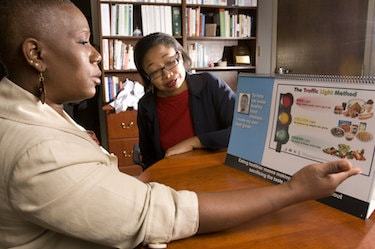 When it comes to our health, we need trained, reliable experts. These vital specialists inform the public, guide policy, and put strategies into action. We need experts in public health, health education, and community health to help us understand health issues. With an online public health degree, graduates will be positioned for these important careers. Online public health degrees build your knowledge in overall health and wellness. They will prepare you for high-demand, well-paying occupations.
When it comes to our health, we need trained, reliable experts. These vital specialists inform the public, guide policy, and put strategies into action. We need experts in public health, health education, and community health to help us understand health issues. With an online public health degree, graduates will be positioned for these important careers. Online public health degrees build your knowledge in overall health and wellness. They will prepare you for high-demand, well-paying occupations.
ARTICLE NAVIGATION:
- Online Public Health Degrees: Certificate | Associate | Bachelor | Bachelor Completion | Graduate Certificate | Master’s | Post-Graduate Certificate | Doctorate
- Accreditation for Online Public Health Degrees
- Can an Online Public Health Degree Meet Certification Requirements?
- Licensure and Certification for Public Health Careers
- Career Outlook with an Online Public Health Degree
- Potential Salary with an Online Public Health Degree
Online Public Health Degree Programs: The Different Levels
Certificate
A certificate in public health prepares students to work as community health workers and more. These programs are both fast and convenient. Students can often complete them online and in less than a year.
For instance, the Certificate in Community Health Worker from St. Catherine University, a 100% online program, requires 15 credit hours. Participants can complete the program in less than nine months.
These programs only require a high school diploma for admission. However, students with an associate or bachelor’s degree can also use certificates to expand their knowledge. The Certificate in Public & Population Health from the University of Kansas is one example. It can be a standalone certificate or used as a specialty for current undergrad students.
GetEducated's Picks
- American University Certificate in Health Inequity & Care
- University of Colorado Denver Certificate in Health Communication
- Minnesota West Community and Technical College Community Health Worker Certificate
Associate
With an associate’s degree in public health, you’ll be qualified to become a community health worker. These online public health degrees require two to three years of study and typically include 60 credit hours of classwork.
You can complete an associate’s in public health entirely online. Some programs cover public health as a broad topic, while others focus on a specific subject. For instance, the Associate of Arts from Cowley County Community College focuses on health service management and community development.
GetEducated's Picks
- American Public University System Associate of Science in Public Health
- Ultimate Medical Academy Associate of Science in Health & Human Services
- Point University Associate of Arts in Public Health
Bachelor
Students who want to become health education specialists should enroll in an online bachelor's in public health. These online public health degrees also build towards a master’s in public health, the degree required for epidemiologists.
These programs require four years when completed full-time. Many degrees are available online, allowing students to complete an education on their schedule.
A bachelor’s degree provides an in-depth education in public health. Focus areas are also available. Some bachelor’s degrees focus on community development, healthcare management, or health communication. Other potential careers from a bachelor’s in public health include environmental science and microbiology.
GetEducated's Picks
- Grand Canyon University Bachelor of Science in Public Health
- Arkansas State University Bachelor of Science in Public Health
- Walden University Bachelor of Science in Public Health
Bachelor Completion
If you have an associate’s degree and want a quick pathway to a bachelor’s in public health, choose a bachelor completion program. These programs, which are available online, require applicants to have an associate’s degree before enrolling.
To finish these programs, students will attend online classes for roughly two years. They require 60 credit hours to complete, adding to the 60 or more you have from an associate’s degree.
The majority of these online public health degrees cover general public health, but a few have specializations. The BS from the Pacific College of Health & Science, for example, focuses on promoting public health.
GetEducated's Picks
- Winthrop University Bachelor of Professional Studies / Community & Health Services
- Mississippi University for Women Bachelor of Applied Science in Public Health Education
- Northern Arizona University Bachelor of Science in Health Sciences / Public Health
Graduate Certificate
Graduate certificates are for people who have a bachelor’s degree in public health or a similar field. They expand students’ knowledge of epidemiology, biostatistics, research methods, health practices, and more.
These certificates focus on a specific issue or topic. They may cover health assessments, environmental health, regulatory affairs, and health systems preparedness. The post-baccalaureate certificate from Stevenson University, for example, studies quality management and patient safety.
These graduate certificates require at least a bachelor’s degree for enrollment. Available 100% online, these certificates may lead to positions assisting epidemiologists. A full master’s degree is required to become a lead epidemiologist.
GetEducated's Picks
- Walden University Graduate Certificate in Public Health
- Benedictine University Graduate Certificate in Epidemiology
- Arcadia University Graduate Certificate in Health Equity
Master’s
Students who want to become epidemiologists need a master’s degree. These programs are largely Master of Public Health (MPH) degrees. Other online public health degrees cover topics such as health communication (Lasell University) or infection prevention (University of Providence).
These programs require a bachelor’s in a health-related topic and can be completed online. Master’s degrees require two to three years of study, for a total of six to eight years of college. (Four or five for a bachelor’s, plus two or three for a master’s.)
Once complete, graduates will be qualified to become epidemiologists. With specialized training, these online public health degrees can also lead to positions as geneticists or biochemists.
GetEducated's Picks
- Saint Mary's University of Minnesota Master of Public Health
- George Mason University Master of Public Health / Public Health Practice
- Ohio University Master of Public Health
Post-Graduate Certificate
Graduates who have completed a master’s degree can enroll in a post-graduate certificate in public health. These programs build a stronger sense of health promotion and disease prevention. Coursework combines research, theory, and practice to create leaders in the health and wellness sector.
Post-graduate certificates require a master’s degree but can be completed online, ideal for epidemiologists and other health experts. They provide expertise in public health, health policy, and health education. This advanced training allows graduates to better communicate health issues to the public and policymakers.
Doctorate
If you want to become a top expert in public health, a doctorate is the best option. These online public health degrees, which require a master’s in public health or a similar field, are available mostly online. In-person requirements vary by program.
A doctorate program qualifies you for any epidemiologist position. Graduates will qualify for leadership and management roles, as well as teaching positions in public health. It will not make you a medical doctor or physician. For this, a medical doctorate is required.
Doctorates take roughly four years to complete. The Doctor of Public Health from Georgia Southern University, for example, requires 60 credit hours. The completion time averages three years.
GetEducated's Picks
- Walden University Doctor of Philosophy in Health Education & Promotion / Behavioral Health (with MS HEP or MPH degree)
- Walden University Doctor of Philosophy in Health Education & Promotion / Behavioral Health (with other MS degree)
- Walden University Doctor of Philosophy in Health Education & Promotion / Global Health (with MS HEP or MPH degree)
Online Public Health Degree Accreditation
Accreditation is the process of confirming a school and a program for academic quality. There is institutional accreditation, delivered by regional groups like WASC Senior College and University Commission (WSCUC) and Southern Association of Colleges and Schools Commission on Colleges (SACSCOC). There is also programmatic accreditation, delivered by groups focusing on a specific area of study.
For both in-person and online public health degrees, approval comes from the Council on Education for Public Health (CEPH). This group accredits bachelor’s and master’s degrees in public health. CEPH is recognized by the U.S. Department of Education.
CEPH accredits numerous programs listed on GetEducated. This includes the MPH programs Benedictine University, Northeastern University, and Liberty University. This is just a tiny sample of the CEPH-accredited degrees in our database.
CEPH does not accredit associate’s degrees. For these programs, applicants should look for institutional accreditation. On the other hand, the group does accredit doctorate of public health degrees. For example, the Doctor of Public Health from the University of South Florida is CEPH-accredited.
Some programs in our database have accreditation by other groups, depending on their focus. For example, the MS in Nursing / Public Health Nursing from Grand Canyon University is approved by the Commission on Collegiate Nursing Education (CCNE).
Resource:
Can an Online Public Health Degree Meet Certification Requirements?
Yes, online public health degrees can prepare you for certification as a public health professional. These careers do not require licensing, as graduates do not work with patients. Voluntary certification, however, may boost your career. It’s often required by employers, especially federal, state, and local governments.
The National Commission for Health Education Credentialing (CHES) provides certification for the public health field. Applicants must hold degrees from accredited colleges to qualify for approval. Many programs listed on GetEducated are accredited by the Council on Education for Public Health (CEPH), which qualifies students for CHES testing.
Resource:
Licensure & Certification After an Online Public Health Degree
No state licensing requirements exist for community health, health education, or epidemiology. This is because these careers do not involve direct patient care. Unlike a nurse, physician, dentist, or pharmacist, graduates do not need licenses for a public health career.
Certification, however, can enhance your career potential. Becoming certified through the National Commission for Health Education Credentialing (NCHEC) gives you a career boost.
Health education specialists can become Certified Health Education Specialists (CHES) through the NCHEC. This is a useful credential not only for health education specialists but epidemiologists as well.
Here is the process for becoming a CHES:
- Firstly, complete a bachelor’s, master’s, or doctoral degree from an accredited institution. CEPH accreditation will qualify, as will regional accreditation.
- Next, apply for the exam. Applicants can apply online through the NCHEC website. The application includes transcripts, advisor letters, and a fee of $100.
- Wait for notice of eligibility. Eligible applicants will receive an “Authorization to Test” letter.
- Then, you will complete the test at one of CHES’s testing centers located across the U.S. The approval letter provides instructions for scheduling your test.
- Prepare for the exam. The exam consists of 165 multiple-choice questions. There may be a review session offered in your area.
- Complete the exam. Students have three hours to complete the test.
- Finally, wait for results. Candidates will receive a pass/fail report. The possible results include “proficient,” “moderately proficient,” or “below proficient”.
Resource:
Careers with an Online Public Health Degree
Epidemiologists will see strong growth as well, but total jobs are far fewer. In 2021, there were an estimated 8,600 epidemiologists in the U.S. This career will see a rapid growth of 26%, resulting in a total of 10,900 jobs by 2031. Despite the high growth rate, it’s still a far smaller number than many careers.
Graduates of these programs can find jobs all across the country. More specifically though, the largest concentration of epidemiologists is found in Colorado, where there are 3.25 epidemiologists for every 1,000 jobs. Community health workers, on the other hand, are most prominent in Alaska, with 2.95 for every 1,000 jobs. Health education specialists are most concentrated in New Mexico, with 3.3 for every 1,000 jobs.
The outlook is strong for public health experts because of an increased interest in keeping people safe from disease. This stems from the COVID-19 pandemic. Specialists who understand how disease spreads, how people can avoid getting sick, and how to recover from illnesses are in high demand.
Online Public Health Degree Salary
Epidemiologists have some of the best salaries in the entire job market. The median salary for all occupations is $45,760. Meanwhile, epidemiologists have a median salary of $78,830. Those working for scientific research institutions have a median salary of $126,470. The top 10% in this profession have salaries over $130,000, so there is plenty of room for growth in this profession.
Health education specialists have decent salaries as well, although not as high as epidemiologists. Of course, the education requirements are also much less for health education specialists. The median salary for this occupation is $60,600, and the top 10% earn over $102,000 a year.
Community health workers have a median salary of $46,590. The top 10% can expect salaries over $70,000, so there is room for financial gain in this occupation as well.
Resources:
Start Your Journey to a Fulfilling Career in Public Health
When you are ready to jumpstart your career and earning potential, explore the options and resources on GetEducated.com. Here, you can find information on top online public health degrees. From certificates to doctorates, you can certainly complete the next phase of your learning with a top-quality online degree.

















